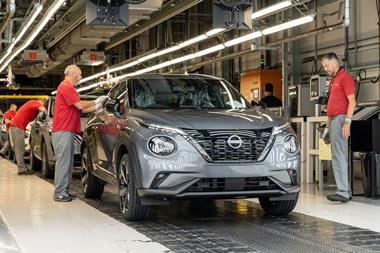The UK’s automotive manufacturing output topped 1m units in 2023, the first time it has reached that level since 2019. Output has been boosted by unprecedented levels of investment and receding supply chain constraints.

However, today’s breakdown of post-Brexit trade negotiations between the UK and Canada has dampened the optimism for the UK automotive market. The suspension in talks means exports from the UK into the country could risk facing higher tariffs, which is especially concerning given that the UK’s growth this past year was driven significantly by overseas demand.
The Society of Motor Manufacturers and Traders (SMMT), which welcomed the UK’s output growth earlier today, has warned that the breakdown in talks could send the signal that exports are not welcome in Canada.
“Canada is an important market for UK car exports and, given the close ties between our two countries, the suspension of trade talks is especially disappointing and sends a signal that the UK’s world-class automotive products are not welcome in Canada,” said Mile Hawes, chief executive, SMMT. “If UK car exports can’t use EU parts and components to avoid additional duties it creates a risk that tariffs, potentially charged on top of luxury goods taxes, could be reintroduced. This would benefit no one, not least Canadian consumers, are we urge all parties to get back around the negotiating table.”
UK manufacturing output recovers
According to the latest industry figures published by the SMMT, record volumes of EVs helped the total value of all cars made in the UK surpass £50 billion ($61.6 billion), while commercial vehicle output reached its highest level since 2010. UK vehicle production hit 1,025,474 units in 2023, with 905,117 cars and 120,357 commercial vehicles (CVs) produced, pushing output up 17.0% on the previous year.
The figures for the UK show that growth was driven significantly by overseas demand, with car exports up almost a fifth and commercial vehicles more than a quarter. The easing of pandemic-related challenges, from chip shortages to lockdowns, and increasing EV model production, combined to drive the annual output, along with £23.7 billion ($30 bn) of private and public investment commitments, which is more than the previous seven years combined.
While 191,247 cars were built for domestic buyers, the lion’s share of output was shipped overseas, which the SMMT said is evidence of the contribution automotive exports make to the UK economy. Year on year, exports rose 17.6% compared with a 13.7% rise in output for the British market. The EU remained by far the sector’s largest global market, taking 60.3% of exports, with shipments up almost a quarter (23.2%) to 430,411 units.
The SMMT said it puts the sector in a far stronger position that 12 months ago, but the challenges are “unrelenting”. The trade body said that measures already announced, such as the government’s Advanced Manufacturing Plan and Critical Imports and Supply Chains Strategy, must now be delivered to cement the UK as an internationally attractive location for investment.
Hawes said: “Britain must ensure it remains an internationally attractive location for investment, and the forthcoming budget is an opportunity to introduce measures that will shore up our competitiveness, from EV market support to affordable green energy, grid connectivity and workforce upskilling.”

























![Global[1]](https://d3n5uof8vony13.cloudfront.net/Pictures/web/a/d/s/global1_726550.svgz)













No comments yet